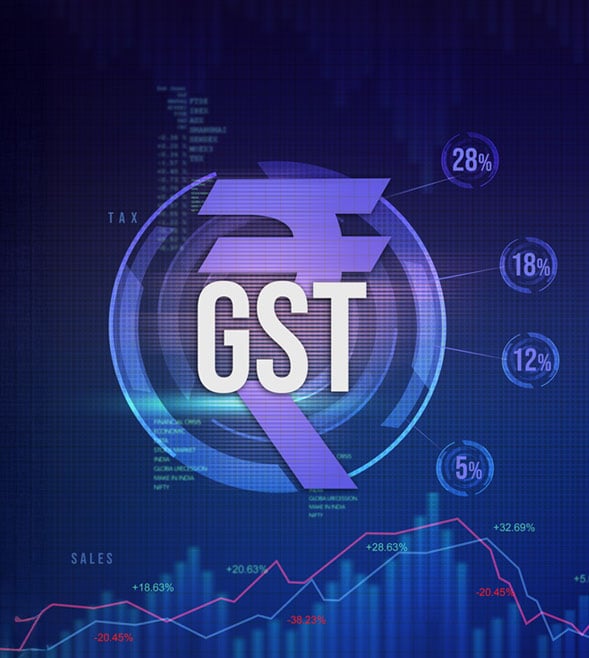
GST 2.0 is being seen as more than just a tax reform; it is a chance for businesses to reset, plan smarter, and build stronger foundations for the future. The updated, predictable framework reduces the number of slabs to simplify compliance, cut down litigation, and provide greater stability for business operations. Essentials like food and medicines are kept affordable under the 5% slab, most goods and services are aligned under a predictable 18%, and luxury or sin goods are placed at 40% to balance revenue needs. While the government faces a projected ₹48,000 crore annual revenue loss, the expectation is that simpler rules and lower rates will boost consumption, improve liquidity, and create a fairer system for consumers and businesses. The impact on CFOs is significant, as these changes will influence how they plan costs, manage liquidity, prepare compliance systems, and shape long-term strategies.
What has changed?
India has moved from four GST slabs to a simplified system: 5% for essentials, 18% for standard goods and services, and 40% for luxury/sin categories. Essentials such as dairy and medicines fall under the lower slab, while items like small cars and two-wheelers are at 18%. Luxury cars, SUVs, and alcohol now attract 40%. While these rate details have been widely reported, what matters for CFOs is understanding how these changes ripple across their specific industry, contracts, and cost structures.
Compliance and policy updates
The GST Council has also introduced compliance measures, such as faster refunds and simpler registrations. Small companies with a GST liability of up to ₹2.5 lakh a month will now receive registration approvals within three working days if marked ‘low risk’. Faster provisional refunds will roll out from November and will also cover inverted duty structures, giving relief to exporters and manufacturers.
Equally crucial for CFOs is the operationalisation of the GST Appellate Tribunal, which should reduce the delays in disputed cases and bring greater certainty to financial planning.
Opportunities for CFOs and businesses
While much of the public debate has focussed on GST rates, the bigger opportunity lies in how these reforms will shape how businesses and their finance leaders operate.
Lower taxes on essentials, building materials, and medicines are expected to make products more affordable. This could boost the demand and reduce cost pressures across supply chains. Faster refunds and fixes to situations where input taxes are higher than output taxes will improve cash flow, giving exporters and manufacturers some much-needed relief. Exemptions on medicines and insurance policies will likely lower employee benefit costs while improving individual access. The launch of the GST Appellate Tribunal by the end of the year is also expected to speed up appeals and reduce the delays in tax disputes.
The withdrawal of anti-profiteering checks gives companies more room to set prices according to market conditions. Finance heads now have greater flexibility to manage margins and balance profitability with competitiveness. The reclassification of intermediary services as exports will also open refund opportunities for service providers.
A simplified GST regime sends a strong signal of policy stability. This could boost investor confidence at a time when banking experts believe GST 2.0 will drive growth in sectors such as retail, MSMEs, agriculture, and renewable energy. Taken together, these shifts are expected to help CFOs strengthen balance sheets, capture new demand, and plan with greater certainty.
Challenges ahead
Such a large-scale reform is not without its difficulties, and businesses will need to prepare carefully. Products moving from 12% to 18% will raise costs and put pressure on margins. Companies must decide whether to pass these costs on to customers or absorb them. Systems like billing software, tax engines, and contracts with vendors and customers will also need updates. While essentials now enjoy lower rates, luxury goods and sin categories face steep hikes at 40%, forcing businesses in these sectors to revisit their demand forecasts.
The transition itself will be complex. Issues like pending credits, ongoing contracts, and discounts will need careful handling. Cash flow management is also expected to become more challenging, as contracts signed under the old structure may not automatically adjust to the new slabs. This could complicate both accounting and compliance.
Changes in how goods and services are classified will also affect how companies claim tax credits, which can alter working capital cycles. While some sectors may benefit from relief on mismatched input and output taxes, others could face fresh liquidity strains. Finance leaders must revise forecasts, update provisions, and prepare their teams to adapt quickly.
Finally, execution risks remain. The new refund system and the launch of the GST Appellate Tribunal are positive steps, but their impact will depend on a smooth rollout and how effectively they work on the ground. The way forward will be about balancing immediate preparedness with long-term planning.
In the coming weeks, the priority will be identifying which products and services have shifted slabs, assessing how this affects margins, and reviewing customer and vendor contracts for timing and transitional provisions. For businesses with extensive inventories, stock replenishment will need particular attention, since purchases made just before or after the new rates could significantly alter margins and cash flows. Equally important will be testing billing and compliance systems to ensure they are ready for the transition and preparing boards with a clear picture of near-term financial impacts.
Over the next six months, the focus will move towards building resilience. CFOs will need to run scenarios to test how different demand patterns and cost structures could play out, strengthen reporting so that GST-related credits and refunds are closely tracked, and prepare their finance and tax teams to handle new refund processes and tribunal proceedings. Clear communication with employees, suppliers, and customers will also be essential to ensure that pricing changes, credit treatments, and invoicing adjustments are understood and managed smoothly.
CFOs who act early and plan well can turn these reforms into a competitive advantage, suggesting that they take proactive steps to manage the GST 2.0 shift. This includes assessing the impact on products and services, consulting tax experts, updating controls and systems, reviewing contracts, and closely tracking government notifications to stay aligned with final rules.
This article first appeared in the Fortune India on 17th September 2025.




